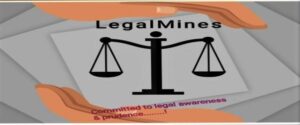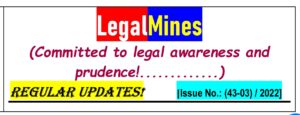 |
 |
31&01-03_04-22(43-03)-Regular Legal Updates & Points
Regular Legal Updates & Points
(Date: 31-03-2022 & 01-04-2022)
| [1] | Word/ Doctrine / Maxims of the Day:
Ibid./ Ibidem: Ibid. is an abbreviation for the Latin word ibidem. It literally means ‘in the same place’. commonly used in an endnote, footnote, bibliography citation, or scholarly reference to refer to the source cited in the preceding note or list item. This is similar to Idem, literally meaning “the same”, abbreviated id., which is commonly used in legal citation. |
| [2] | Question (?) / Issue for Discussion of the Day: The ‘Powers, Privileges and Immunities of Parliament and its Members’ as envisaged in Article 105 of the Constitution leave room for a large number of uncodified and unenumerated privileges to continue. Assess the reasons for the absence of legal codification of the ‘parliamentary privileges’. How can this problem be addressed? |
| [3] | Law / Bill of the Day: Arrest by Private Person: Section 43 Cr.P.C. : Section 43 of the Cr.P.C. talks of arrest by private person and procedure on such arrest. It provides that any private person may arrest or cause to be arrested any person who in his presence commits a non-bailable and cognizable offence, or any proclaimed offender, and, without unnecessary delay, shall make over or cause to be made over any person so arrested to a police officer, or, in the absence of a police officer, take such person or cause him to be taken in custody to the nearest police station. Further if there is reason to believe that such person comes under the provisions of Section 41 (when police may arrest without warrant), a police officer shall re-arrest him. Furthermore, if there is reason to believe that he has committed a non-cognizable offence, and he refuses on the demand of a police officer to give his name and residence, or gives a name or residence which such officer has reason to believe to be false, he shall be dealt with under the provisions of Section 42 (arrest on refusal to give name and residence); but if there is no sufficient reason to believe that he has committed any offence, he shall be at once released. |
| [4] | Memorable Case Laws:
(1) Mohini Jain Vs State of Karnataka (1992 AIR 1858): The fact of the case is that the Government of Karnataka issued a notification that permitted the private medical colleges in the State of Karnataka to charge exorbitant tuition fees from the students admitted other than the “Government seat quota”. Miss Mohini Jain, a medical aspirant student filed a petition in Supreme Court challenging this notification. The Hon’ble Supreme Court of India raised an important question that “whether right to education is guaranteed to the Indian citizen under the Constitution of India?” The Supreme Court of India observed that mention of “life and personal liberty” in Article 21 of the Constitution automatically implies some other rights, those are necessary for the full development of the personality, though they are not enumerated in Part III of the Constitution. Education is one such factor responsible for overall development of an individual and therefore, right to education is integrated in Article 21 of the Constitution. (2) Navtej Singh Johar v. Union of India (AIR 2018 SC 4321): The constitutional validity of Section 377 of the Indian Penal Code, 1860, as to consensual sexual behavior of adults of the same sex in private was the central issue of the case. Section 377, titled “Unnatural Offences,” stated that “anyone who voluntarily has carnal intercourse with any man, woman, or animal against the order of nature shall be punished with life imprisonment or imprisonment of either description for a term of up to ten years, and shall also be liable to a fine. The five-judges Bench of the Hon’ble Supreme Court examined the constitutionality of Section 377 in light of the principles enunciated in Articles 14, 15, 19, and 21. Finally, Section 377 of the Indian Penal Code was unanimously repealed by the SC. |
| [5] | Memorable Points (IEA): Memorable points[2] as to Indian Evidence Act, 1872 (IEA) and law of evidence are as under (total 87 points as to IEA already covered under previous issues of “Daily Updates”) —
(1) The terms ‘proved’, ‘not proved’ and ‘disproved’ are defined under Section____of the IEA—Section 3. (2) True/ False: A fact is said to be disproved when, after considering the matters before it, the Court; either believes it to exist, or considers its existence so probable that a prudent man ought, under the circumstances of the particular case, to act upon the supposition that it exists—False (Refer Section 3 of the Indian Evidence Act, 1872) (3) True/ False: A fact is said to be proved when, after considering the matters before it, the Court either believes that it does not exist, or considers its non-existence so probable that a prudent man ought, under the circumstances of the particular case, to act upon the supposition that it does not exist— False (Refer Section 3 of the Indian Evidence Act, 1872) (4) True/ False: A fact is said not to be proved when it is neither proved nor disproved—True (Refer Section 3 of the Indian Evidence Act, 1872) (5) The terms ‘may presume’, ‘shall presume’ and ‘conclusive proof’ are defined under Section____of the IEA—Section 4 (6) Evidence may be given in any suit or proceeding of the existence of non-existence of every fact in issue and of such other facts as are declared to be relevant, and of no others. It is so mandated under Section____of the IEA—Section 5 |
| [6] | Memorable Points (Misc.): Memorable points under Indian Constitution and various miscellaneous important Acts are as under (total 350 points already covered under previous issues of “Daily Updates”)—
(1) Constitution of India, 1950: As per Article_____of the Indian Constitution, no person shall be compelled to pay any taxes, the proceeds of which are specifically appropriated in payment of expenses for the promotion or maintenance of any particular religion or religious denomination—Article 27. (2) Code of Civil Procedure: Section______of the CPC, 1908 deals with the effect of rules in First Schedule—Section 121 (3) Criminal Procedure Code, 1973: Section 395 of the Cr.P.C. deals with the—Reference to the High Court. (4) Indian Penal Code, 1860: A person who does any act or is guilty of an illegal omission which causes any common injury, danger or annoyance to the public or to the people in general who dwell or occupy property in the vicinity, or which must necessarily cause injury, obstruction, danger or annoyance to persons who may have occasion to use any public right is guilty of offence of—Public Nuisance (Refer Section 268 of the IPC) (5) Transfer of Property Act, 1882: Where, on a transfer of property, an interest therein is created in favour of a person to take effect only on the happening of a specified uncertain event, or if a specified uncertain event shall not happen, such person thereby acquires a ______________in the property—Contingent Interest. (Refer Section 21 of the TPA, 1882) (6) Indian Contract Act, 1872: A contract to do or not to do something, if some event, collateral to such contract, does or does not happen is called—Contingent Contract (Refer Section 31 of the Indian Contract Act, 1872) (7) Partnership Act, 1932: True/ False: An admission or representation made by a partner concerning the affairs of the firm is evidence against the firm, it is made in the ordinary course of business—True (Refer Section 23 of the Partnership Act, 1932). (8) Sale of Goods Act, 1930: True/ False: A warranty is a stipulation essential to the main purpose of the contract, the breach of which gives rise to a right to treat the contract as repudiated—False (Refer Section 12 of the SOGA,1930) (9) Specific Relief Act, 1963: Which Schedule of the Specific Relief Act, 1963 deals with the category of projects and Infrastructure Sub-Sectors—Schedule -I (10) Negotiable Instrument Act, 1881: The terms “Inland Instruments” is defined under Section____of the NI Act, 1881—Section 11 |
| [7] | G. K. / Current Affairs:
(1) The chairman of the Committee on Public Accounts is nominated by whom? –Lok Sabha Speaker. (2) For how many times, a person can become President of India?—No limit (3) Which Article of the Constitution speaks about impeachment of the President of India?—Article 61 (4) The amendment of the constitution can be initiated in which House—Either Lok Sabha or Rajya Sabha (5) Which State has became India’s first State Assembly to implement the National e-Vidhan Application (NeVA) programme to become paperless—Nagaland. |
**********
Thanking You!
[1] . Earlier, it was published as “Daily Legal Updates and Points”
[2] . The readers please be informed that total 83 and 84 memorable points of the Indian Penal Code, 1860 and CPC, 1908 have been respectively covered under previous issues of “Daily Legal Updates & Points”
